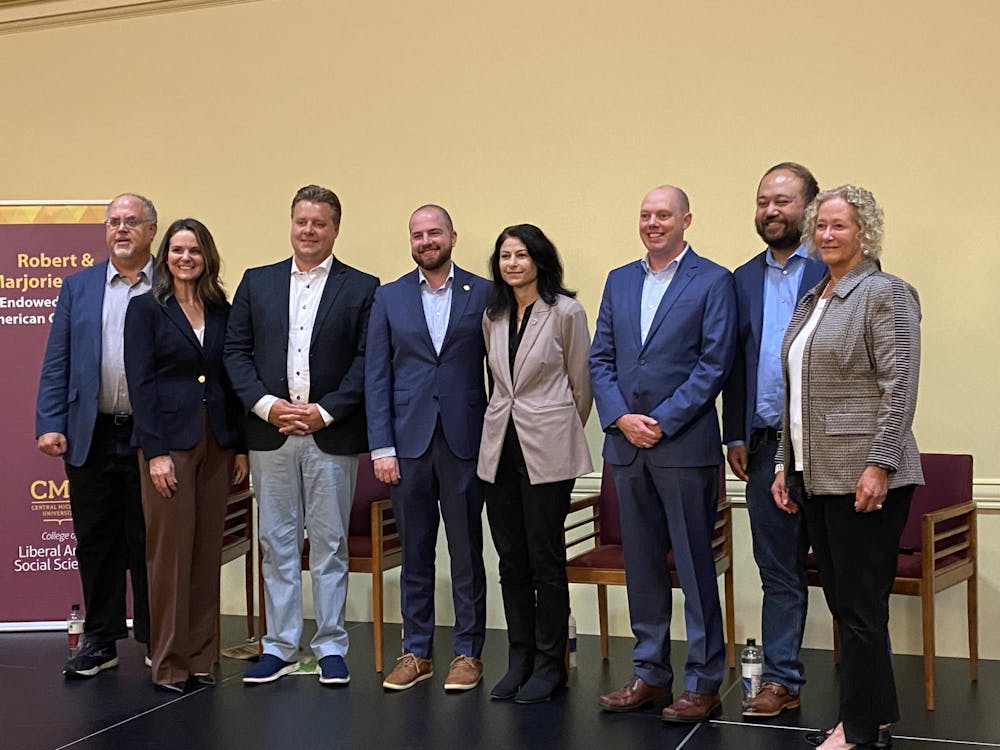'You belong here': Michigan Attorney General speaks at Griffin Forum Panel
In a packed house, the Oct. 2 Griffin Forum on LGBTQ+ policy hosted two of the only openly gay members of the Michigan government.
The forum, which took place in the Pearce Hall Ballroom, began with a video released by state Attorney General Dana Nessel. The video was produced by Nessel and Senator Jeremy Moss, Michigan’s first openly gay state senator and current President Pro Tempore.
The theme was of Michigan being an “equality state,” and how all people, regardless of gender identity or sexual orientation, “have a place here in Michigan.”
Nessel and Moss, along with their fellow panelists Frank Foster, a former member of Michigan’s House of Representatives and Jack Day, an assistant professor at CMU, would continue to stress this point throughout the event, though first presenting an overview on the history of this issue.
LGBTQ Status in civil rights
The narrative began with the Elliott-Larsen Civil Rights Act of 1976, in which the namesakes, Daisy Elliott, a Democrat, and Mel Larsen, a Republican, outlined a law to meant to, according to its enacted article, “prohibit discriminatory practices, policies and customs in the exercise of those rights based upon religion, race, color, national origin, age, sex, height, weight, familial status or marital status.”
This act did not include protections on the basis of sexual orientation or gender identity, leaving many LGBTQ+ individuals, as Moss said, “without a path to justice.”
This led to the movement to add such provisions, led by both Democrats, and as Foster, a Republican himself stated, some Republicans. He worked to “help other Republicans form … an alliance,” Foster said, in the hopes of bipartisan support for such a measure passing.
“A welcoming Michigan is good for business,” not just LGBTQ+ individuals, he said.
Unfortunately, he said, such a cause was not popular in polling, and both these attempts at amending the act -- as well as his subsequent re-election campaign -- ended in defeat. However, this was not the end for the movement, nor was it a deterrent for advocates of the cause/
“We lost," Foster said, "but it was well worth it.”
Enter attorneys and lawyers such as Nessel, who argued several lawsuits on the basis that Elliott-Larsen Act’s definition of sex as a protected identity inherently included LGBTQ+ individuals.
"You can’t tell if a person is gay or transgender unless you know what their sex is," Nessel said.
That led the movement to begin gaining steam, culminating in Michigan Gov. Gretchen Whitmer signing into law an expansion of the Elliott-Larsen Act that included protections for LGBTQ+ Michigan residents.
A tumultuous present
Many changes have since been made for the continued protection and expansion of LGBTQ+ rights, including as Moss said, a “pro-equality majority for the very first time in Michigan’s history."
However, an effort is being made to reverse this trend, according to Nessel, in the form of hundreds of anti-LGBTQ+ bills and legislation being introduced all across the nation.
She specifically referenced legislation in Florida, where the controversial proposal colloquially known as the "Don’t say gay" bill was introduced. Nessel said this attempt to silence conversation is part of an effort to prevent the normalization of LGBTQ+ individuals and identities.
“They don’t want to talk (about it) because that might normalize it,” she said of opponents of LGBTQ+ causes. It’s not easy to hate a group of people, such as people who identify as gay or transgender, when someone in your life is a part of that group. Therefore opponents want to make sure you “don’t know anybody like that,” she said.
“The reason we want to herald what we’re doing is we want to set the narrative differently,” Moss said.
Moss doesn’t just present acceptance of the LGBTQ+ community as a positive for only those who identify as such.
“You don’t have to be LGBTQ to benefit from (these policies),” he said. The increased sense of acceptance “is going to enhance Michigan,” because as Gov. Whitmer said, “bigotry is bad for business.”
What can we do?
Once the floor opened to a Q&A session, the focus shifted towards actions on an individual level. One anonymously submitted question asked what college students can do for these issues.
Sen. Moss stressed the importance of “coming out,” or becoming publicly open about your sexuality or gender identity.
“Living your authentic self moves this issue forward more than anything else,” he said.
Adding to this, Foster highlighted the value of doing “what (the audience) was already doing,” by continuing to show up to make their voices heard and learn more about the issues they care about.
A personal precursor
Learning and understanding issues close to oneself had been a value Nessel expressed during her brief conversation with one of the classes in Anspach Hall prior to the event, in which she gave a more in-depth description of her background and what led her to where she is today.
Her story began began with her first trial while still in law school, a homicide case, and led to how her discontent with previous failures in cases related to same-sex couples inspired her to run for Attorney General in 2018. She become Michigan’s first statewide openly LGBTQ elected official and advocate for the cause.
In order to fight for a cause, she said, it is helpful to “become a subject matter expert” in that particular cause.
“We can’t know everything all the time, but we can take one area ... and develop an expertise,” she said.







